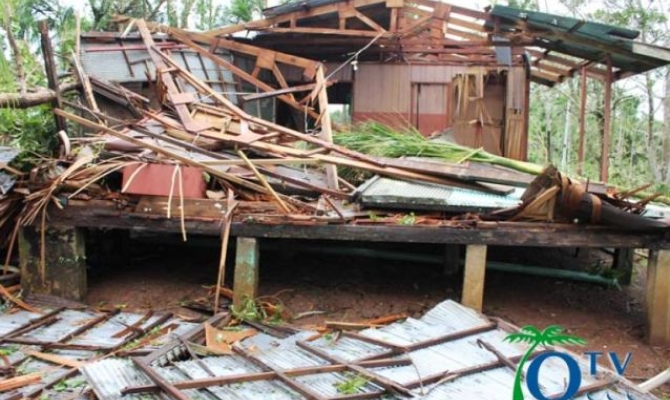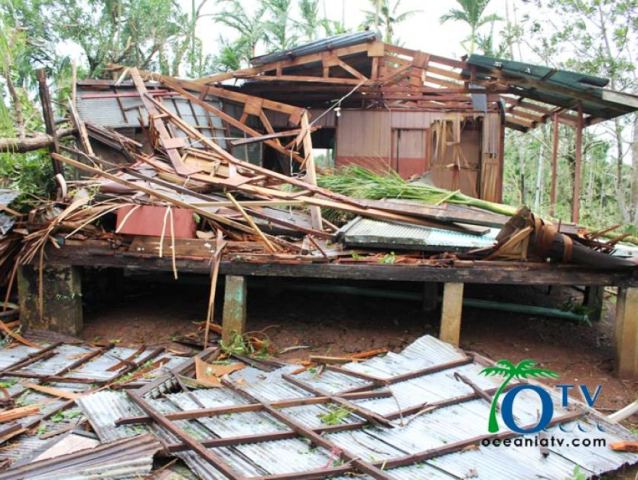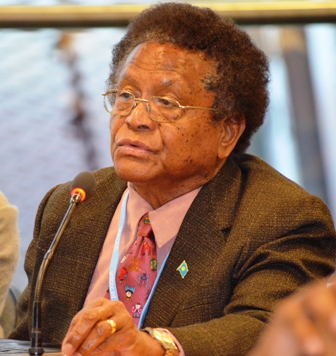
Climate Change Resilience
15 November, UNFCCC, Warsaw Poland - Over a period of 12 months Palau has had to endure both Bopha and Haiyan that went on to become Super Typhoons bringing devastation to the Philippines.
This month Typhoon Haiyan flattened the island of Kayangel in the north of Palau destroying all homes on the island with very few buildings left standing.
While there were no fatalities, it is believed that early warnings and preparation helped, with government issuing a mandatory order to evacuate before the typhoon.
The 68 residents that refused to evacuate ahead of the typhoon were sheltered in the government building, the state office and dispensary and one concrete house.
All residents have since had to be removed from the island as it is no longer livable, there is no access to power or water and only the few remaining buildings providing shelter.

Typhoons and storms were referred to by the President of Palau, Tommy Remengesau Jnr when he made his statement to the 68th session of the UN General Assembly in September this year.
"Our Global Warming doomsday is already set in stone if we fail to act. It is therefore our job, as Leaders, to take all necessary actions to eliminate the current threat," read President Remengesau when making his statement, calling upon "Leaders to Lead."
Now two months later at the 19th Conference of the Parties to the United Nations Framework Convention on Climate Change (UNFCCC COP19) Palau reiterates this, reflecting on the short recovery time in between typhoons. Bopha struck in December last year and less than 11 months later Haiyan, hit Palau, barely allowing enough time for the island nation to recover from Typhoon Bopha.
"We are resilient and we want to work hard and we try to recover but when it occurs more frequently with greater intensity - our ability to respond and recover just gets more and more diminished so that's a real issue for us here," said Ambassador Dr. Caleb Otto, Palau's Ambassador and Permanent Representative to the United Nations.
 Ambassador Otto, Palau
Ambassador Otto, Palau
"I have been saying it almost every time I have an opportunity to speak, we need a sense of urgency, even now we are still talking about the scaling up, the emissions and the donations - I get disappointed at times because it is so much process. We don't have time."
It is this plight of small island nations that motivates the Alliance of Small Island States (AOSIS) in their ask for urgent reductions to greenhouse gas emissions. Palau as a member of AOSIS is concerned by Japan's announcement to reduce their emissions reduction target. The Island nation has a special friendship with Japan.
"Unless the international community works together to urgently reduce the greenhouse gas emissions responsible for climate change, we know more storms like Haiyan lie just around the corner. This is the reality Island Nations face today," said a statement from the group of 44 low-lying island and coastal nations.
Japan is the world's fifth largest emitter of greenhouse gases, the announcement by them at the UN Climate talks in Warsaw is a step backwards in the global effort to hold warming below the 1.5 degree Celsius threshold. It puts Pacific populations at much greater risk than they are already at . In response to this news the AOSIS statement reads:
"I'm just hoping that this Warsaw COP will make a difference, that's a big hope. I'm hoping at the end of this COP we will see something concrete. No more 'business as usual' carry on, we must reduce emissions, together. Now."
This month Typhoon Haiyan flattened the island of Kayangel in the north of Palau destroying all homes on the island with very few buildings left standing.
While there were no fatalities, it is believed that early warnings and preparation helped, with government issuing a mandatory order to evacuate before the typhoon.
The 68 residents that refused to evacuate ahead of the typhoon were sheltered in the government building, the state office and dispensary and one concrete house.
All residents have since had to be removed from the island as it is no longer livable, there is no access to power or water and only the few remaining buildings providing shelter.

Photo: Typhoon Haiyan has devastated the island of Kayangel in Palau's north, according to an assessment of damages by emergency crews after the super typhoon struck overnight.
Image: Oceania TV News, Palau
Image: Oceania TV News, Palau
Typhoons and storms were referred to by the President of Palau, Tommy Remengesau Jnr when he made his statement to the 68th session of the UN General Assembly in September this year.
"Our Global Warming doomsday is already set in stone if we fail to act. It is therefore our job, as Leaders, to take all necessary actions to eliminate the current threat," read President Remengesau when making his statement, calling upon "Leaders to Lead."
Now two months later at the 19th Conference of the Parties to the United Nations Framework Convention on Climate Change (UNFCCC COP19) Palau reiterates this, reflecting on the short recovery time in between typhoons. Bopha struck in December last year and less than 11 months later Haiyan, hit Palau, barely allowing enough time for the island nation to recover from Typhoon Bopha.
"We are resilient and we want to work hard and we try to recover but when it occurs more frequently with greater intensity - our ability to respond and recover just gets more and more diminished so that's a real issue for us here," said Ambassador Dr. Caleb Otto, Palau's Ambassador and Permanent Representative to the United Nations.
 Ambassador Otto, Palau
Ambassador Otto, Palau"I have been saying it almost every time I have an opportunity to speak, we need a sense of urgency, even now we are still talking about the scaling up, the emissions and the donations - I get disappointed at times because it is so much process. We don't have time."
It is this plight of small island nations that motivates the Alliance of Small Island States (AOSIS) in their ask for urgent reductions to greenhouse gas emissions. Palau as a member of AOSIS is concerned by Japan's announcement to reduce their emissions reduction target. The Island nation has a special friendship with Japan.
"Unless the international community works together to urgently reduce the greenhouse gas emissions responsible for climate change, we know more storms like Haiyan lie just around the corner. This is the reality Island Nations face today," said a statement from the group of 44 low-lying island and coastal nations.
Japan is the world's fifth largest emitter of greenhouse gases, the announcement by them at the UN Climate talks in Warsaw is a step backwards in the global effort to hold warming below the 1.5 degree Celsius threshold. It puts Pacific populations at much greater risk than they are already at . In response to this news the AOSIS statement reads:
"We deeply sympathize with the tragedy Japan suffered as a result of the Fukushima disaster, and our thoughts and prayers are with the people of Japan as they continue to manage the difficult impacts of this ordeal.For Ambassador Otto of Palau, it's hard to remain optimistic but he is hopeful that there will be a global outcome that will keep Palau and r its people, safe from harm and secure in livelihood. Having suffered through the two typhoons within the spate of 12 months, there is concern for what may come next.
"While we recognize the challenge Japan and other countries face in meeting their energy needs, there are abundant renewable energy alternatives available to Japan and all countries to replace fossil fuels with clean energy. We must redouble our efforts to do what is necessary to ensure a safe climate future."
"I'm just hoping that this Warsaw COP will make a difference, that's a big hope. I'm hoping at the end of this COP we will see something concrete. No more 'business as usual' carry on, we must reduce emissions, together. Now."